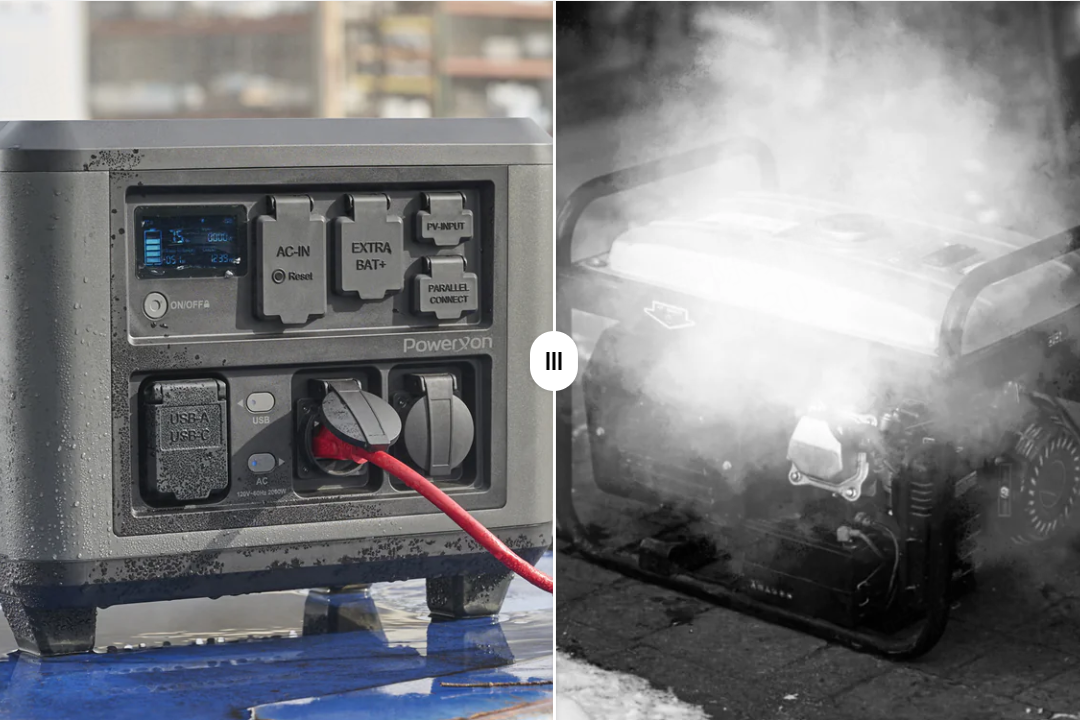In today's energy-driven world, portable power solutions are becoming a necessity. Whether you're camping, preparing for emergencies, or powering devices during an outage, the decision between using a portable power station and a traditional generator can impact your experience. Both options serve the critical function of providing backup power, but they differ significantly in terms of efficiency, eco-friendliness, and convenience.
Let's take a closer look at the strengths and drawbacks of each, so you can decide which power source is best for your specific needs.
1. Power Source and Environmental Impact
Portable Power Stations: Powered by rechargeable batteries, such as LiFePO4 (Lithium Iron Phosphate) batteries, these stations are a greener option. They can be recharged through solar panels, wall outlets, or car chargers. With zero emissions, portable power stations provide an eco-friendly solution without using fossil fuels, making them an ideal choice for environmentally conscious users.
Traditional Generators: These rely on fossil fuels like gasoline, diesel, or propane, which produce harmful emissions. The environmental impact of conventional generators is significant due to their contribution to pollution. In situations where sustainability is important, traditional generators fall short.
Winner: Portable power stations offer a much cleaner energy alternative with no emissions and renewable charging options.
2. Noise Levels
Portable Power Stations: Thanks to their battery-powered nature, portable power stations operate silently. This makes them perfect for camping trips, RV parks, and home use, where a quiet environment is important. You won't need to worry about disturbing your surroundings with excessive noise.
Traditional Generators: Generators, powered by internal combustion engines, tend to be quite noisy. The constant hum and vibrations from these units make them less suitable for quiet settings, especially in noise-sensitive environments like residential areas or campgrounds.
Winner: Portable power stations, with their silent operation, are a clear choice for peace and quiet.
3. Portability and Weight
Portable Power Stations: Designed to be compact and lightweight, portable power stations are easy to carry and move around. Many models, like PowerXon's offerings, come with durable housings and convenient handles, making them easy to transport. Their compact size also means they can be easily stored in a car, garage, or closet.
Traditional Generators: While some generators are labeled as "portable," they are often bulky and heavier due to the added weight of fuel tanks and engines. Moving them requires more effort, and they are less practical for situations where mobility is essential.
Winner: For ease of movement and storage, portable power stations outperform traditional generators.
4. Power Output and Capacity
Portable Power Stations: Ideal for powering small to medium devices, portable power stations can handle gadgets like laptops, smartphones, lights, mini-fridges, and even power tools, depending on the model. While they have limitations in terms of overall power output, newer models—such as PowerXon's—can handle larger appliances for short durations.
Traditional Generators: If you need to power large appliances or a whole house during an extended power outage, traditional generators offer higher power output. They can provide enough energy to run heavy-duty equipment or entire electrical systems.
Winner: Traditional generators offer more power for large-scale needs, but portable power stations are sufficient for most everyday applications.
5. Maintenance and Operation
Portable Power Stations: With no moving parts and no need for fuel, portable power stations are essentially maintenance-free. All you need to do is keep them charged and store them properly when not in use. This makes them a hassle-free solution for people who prefer a plug-and-play approach.
Traditional Generators: These require regular maintenance, including oil changes, fuel management, and periodic tune-ups. Additionally, generators can develop issues with their fuel supply, particularly in cold weather, making them more complex to maintain and operate.
Winner: Portable power stations are far easier to maintain, with no fuel, no oil, and no mechanical parts to service.
6. Cost Efficiency
Portable Power Stations: While the upfront cost of a portable power station might be higher, especially for high-capacity models, the long-term savings can be substantial. There are no recurring costs for fuel, and using renewable energy sources like solar panels further reduces operating costs.
Traditional Generators: They may be less expensive upfront, but the ongoing costs for fuel, oil, and maintenance can add up over time. Fuel prices fluctuate, and in times of crisis or natural disasters, the cost and availability of fuel may become an issue.
Winner: In the long run, portable power stations prove to be more cost-effective, especially if solar charging is an option.
7. Use Cases
Portable Power Stations: Modern portable power stations, like those from PowerXon, are not only great for outdoor adventures such as camping and road trips, but they can also handle heavy-duty tasks. With high-output models capable of delivering substantial wattage, they are ideal for powering power tools, large appliances, and even construction equipment on job sites.
Traditional Generators: Traditional generators remain a strong option for long-term power needs and for powering very large appliances or entire homes during extended outages. However, their noise, fuel dependency, and higher maintenance requirements may make them less suitable for some users, especially those looking for convenience and a quieter solution.
Conclusion: Which Is Better for You?
Choosing between a portable power station and a traditional generator depends largely on your specific needs. If you value eco-friendliness, quiet operation, and portability, a portable power station—like those from PowerXon—is the perfect choice. With features like sealed aluminum housing, an IP65 rating, and a built-in fire extinguisher, PowerXon's portable power stations are designed for safety and durability, making them ideal for a variety of applications.
However, if you need high power output for extended periods, especially in areas where fuel is readily available, a traditional generator may still be a better option.
Ultimately, for those looking for a clean, quiet, and low-maintenance power solution, PowerXon's portable power stations offer the perfect balance between power and portability.
Explore PowerXon's range of innovative portable power stations today, and discover a cleaner, quieter way to stay powered on the go.


